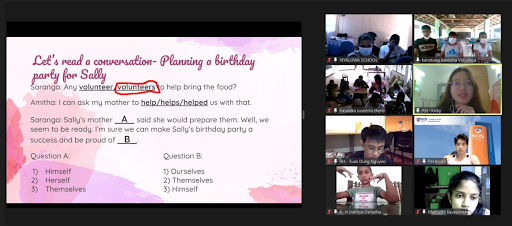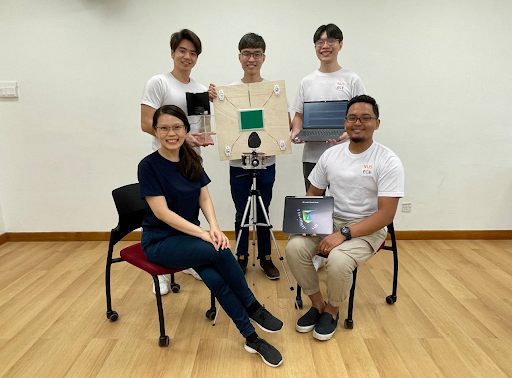Bryan Cheung never expected to reach his dream of attending university.
The 26-year-old, who is currently in his third and final year of his degree in Electrical Engineering at the National University of Singapore’s (NUS) College of Design and Engineering (CDE), scored only 91 for his PSLE.
Afterwards, he went through the Normal Technical stream, and eventually enrolled at ITE College Central with a National Institute of Technical Education Certificate (NITEC) in Aerospace Avionics.
However, he did not meet the minimum GPA requirement to enter Polytechnic.
It was a “demoralising” prospect, Cheung acknowledged.
Despite this, he did not stop attempting to achieve his dream of reaching university.
“I had to write appeal letters to all five polytechnics, (and) go down to their administrative offices to submit my application,” he said.
“Thankfully, I was accepted into Temasek Polytechnic’s Engineering - Aerospace Electronic course through the Direct Admission Exercise based on leadership qualities and volunteering contributions to the community.”
Polytechnic was a struggle
Unfortunately, things did not get easier for Cheung in Polytechnic.
“I did not do well on my term tests in the first semester as I wasn’t from the O Level stream and did not study subjects such as E-Math, A-Math and Physics,” Cheung recalled.
During his lectures, he also found himself struggling more than his peers. He had difficulty comprehending the lecturers while his friends understood the fundamentals.
Cheung said, “I think in general, I just accepted that I’m a slow learner. What other students take one hour to complete will take me five hours.”
“I realised that I should put in more effort. I burned the midnight oil to re-watch the lectures and do some searches on Google while trying to understand what my prof was saying.”
Cheung added that he was very grateful to receive plenty of support from his peers and in particular his lecturers, who organised extra classes after school to help weaker students like him.
Cheung eventually graduated from polytechnic with a Diploma in Aerospace Electronic and Plus Programme in Management and Enterprise, and won multiple awards, including the Edusave Skills Award and Edusave Award for Achievement and Good Leadership and Service (EAGLES).
Accepting and learning from failure is important
Unsurprisingly, one of the biggest lessons Cheung has learned is the acceptance of failure.
Cheung joked: “I faced failure at a young age, so I’m ok with it.”
Adding that failure is how he motivates himself to find solutions in his studies, Cheung said, “It is through failure that we learn to accept it and understand why we failed.”
Cheung also expressed gratitude to his parents for not putting any pressure on him.
“I think at the end of the day, the reason why I studied well and managed to go poly and university is because there's no extra pressure from my parents, because I feel sometimes this kind of pressure does affect their children’s studies.”
Paying it forward
Just as significant to Cheung is the importance of giving back – a lesson which Cheung credits to his friends who were his “pillar of support” in overcoming various difficulties in his polytechnic and university classes.
As such, when he finally achieved his dream of entering university, he wanted to ensure that he helped those around him as he knew how it felt to struggle with school work.
This motivated Cheung to volunteer as a peer tutor in NUS CDE for various electrical engineering courses where he has excelled, to help students who either have not scored well or require additional lessons.
 Cheung (right) tutoring his fellow student Jerald Seu. Photo courtesy of Bryan Cheung
Cheung (right) tutoring his fellow student Jerald Seu. Photo courtesy of Bryan Cheung
For Cheung, this is his way of giving back the help that he himself received from the peer tutoring programme when he first entered university.
Additionally, he is also involved in carrying out multiple volunteering activities within NUS under the Raffles Hall Overseas Community Involvement Programme (OCIP).
This includes leading a tutoring programme in Sri Lanka, where members of Raffles Hall OCIP offered online English tuition to grade 6 to 12 (equivalent to Singapore’s upper primary and secondary school levels) Sri Lankan students from needy families.
 Cheung (third row, right) tutoring Sri Lankan students via a Zoom call. Photo courtesy of Bryan Cheung
Cheung (third row, right) tutoring Sri Lankan students via a Zoom call. Photo courtesy of Bryan Cheung
Another project he has carried out is an online cultural exchange programme with Vietnamese students which also includes tuition for subjects such as English, Mathematics and Science.
Becoming a volunteer at Siglap CC at the encouragement of MP Maliki Osman
In fact, Cheung’s volunteering activities started before he entered university.
Cheung was inspired to become a volunteer when he received his Edusave Skills Award, at the encouragement of Member of Parliament Maliki Osman, shortly after graduating from Temasek Polytechnic.
Subsequently, he joined Siglap CC as a volunteer – a role he has held up to the present for over four years.
Some of his work has included visiting less privileged families and seniors as a Community Care (ComCare) volunteer to befriend them and prepare food supplies.
Cheung added that in reaching out to seniors in Siglap estate as a ComCare volunteer, he found out that many of them were living alone.
As such, his interaction with the seniors also involves checking in on whether they are fine and finding out how they are.
FYP is a culmination of both his academic and volunteering experiences
Cheung’s Final Year Project (FYP) in NUS is essentially a culmination of both his academic and volunteering efforts, in which he is currently developing a system that will help to detect when the elderly suffer a fall and alert their caretakers, in collaboration with Siglap CC.
 Cheung (top left) with his FYP teammates Ryan Tan Jun Hao, Abdul Hadi Bin Abdul Samad and
Cheung (top left) with his FYP teammates Ryan Tan Jun Hao, Abdul Hadi Bin Abdul Samad and
Wee Xin Ze, and supervisor Dr Chua Dingjuan, posing with their elderly fall detection system. Photo courtesy of Bryan Cheung
Cheung (top left) with his FYP group mates and supervisor Dr Chua Dingjuan, posing with their elderly fall detection system.
The inspiration for designing the fall detection system was the rising number of seniors throughout Singapore who were at risk of falling at home.
According to the Health Promotion Board (HPB), about one-third of older people aged 60 and above have fallen more than once, and may experience pain, disability, loss of independence and premature death as a result.
As Cheung wanted his FYP to help his community, he decided to tackle this problem which is particularly acute for seniors who stay alone.
He recalls incidents where "an elderly fell down in the house and couldn't move the entire day, waiting for a neighbour or family member to hear his cry for help."
As such, Cheung leant on his volunteering experience to conduct research on the elderly and their fall rate for his FYP.
This involved interviewing the seniors and befriending them to find out more about the risks that they face, as well as the ideal way to design the sensor.
Applying the knowledge he has learned to design the sensor
In highlighting the potential of technology for elder care, Cheung said that instead of caretakers constantly monitoring seniors, this new system designed together with his group mates uses artificial intelligence and the Internet of Things (IoT) to detect falls.
Once a fall is detected, the system notifies the user through a bot message, and real-time data can be easily viewed via an online dashboard.
Cheung also refined the development of the surveillance system so that it used Light Detection and Ranging (LiDAR) to detect the fall of an individual, responding to feedback given by the elderly, who preferred to avoid the use of wearable devices or the installation of a CCTV over concerns of personal privacy.
The methodology used to detect the fall of an elderly involves the use of 2D and 3D mapping of the user which is then subject to a machine learning algorithm to determine the fall with 96-98 per cent sensitivity (as ascertained from 160 test scenarios).
The sensor is designed based on HDB’s 2-room Flexi flats which are designed for seniors, but is compatible with various kinds of housing.
Cheung highlighted the interdisciplinary nature of CDE and being able to take courses outside of his college, as a key reason for why he could even conceive of his project in the first place.
On the technical front, Cheung relied heavily on the knowledge he gained from his CDE courses and the support of his professors, such as his FYP supervisor.
In particular, Programming Methodology and Linear Algebra for Engineering were instrumental in helping him design the surveillance system for his fall detection system.
Under Programming Methodology, Cheung learned the programming language Python, which enabled him to design a coding algorithm to extract the data points of the LiDAR sensor.
This code was complemented with what he learnt in Linear Algebra, which taught him the formulae for developing 2D and 3D mapping so as to capture a fall, and “equipped him with the know-how to design an algorithm which filters out the background environment, to make the system more accurate.”
All of these were integrated together with the knowledge he gained from other CDE courses such as the ability to design the software and hardware for the detection system.
Outside of CDE, Cheung said an important class which helped him with his research was “Singapore: Imagining the Next 50 Years” under the Faculty of Arts and Social Sciences.
This involved research on different demographics within Singapore’s population, which he was able to draw upon when interviewing the elderly for his FYP,
Aiming for a postgraduate degree next
After graduating from NUS, Cheung is keen to pursue a postgraduate degree and a career in the rail industry later on.
When asked for advice to give to people who may be going through what he did in the past, Cheung replied:
“Don’t give up and keep moving forward. In life, you will always face failure at a certain point in time. But you should not give up.”
He added, “Nothing is easy. Treat it (failure) as a short-term sacrifice for a long-term future.”
To find out more about the curriculum offered by NUS’s College of Design and Engineering, click here.
This is a sponsored article by National University of Singapore.
Top photos courtesy of Bryan Cheung
If you like what you read, follow us on Facebook, Instagram, Twitter and Telegram to get the latest updates.
